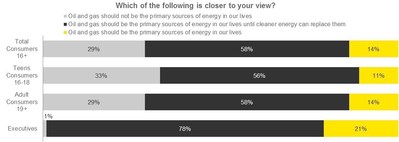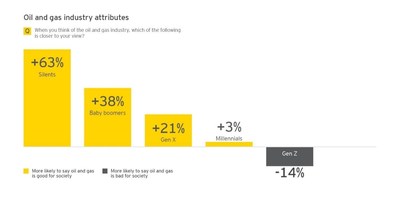US consumers positive about energy industry but sentiment erodes between generations, finds EY oil and gas perception survey
- The energy industry has a solid +21% net positive perception rating among consumers
- For oil and gas specifically, positive sentiment is tied to generations, peaking with the Silent Generation; a bare majority of millennials sees the industry as good for society, and most Gen Z respondents view it as bad for society
- Both oil and gas executives (78%) and consumers (58%) believe oil and gas should be the primary sources of energy until cleaner fuels can replace them
HOUSTON, May 10, 2017 /PRNewswire/ -- Americans value oil and gas for important reasons, but those motivations do not necessarily translate into support for the industry's future. Eighty percent of consumers responding to a recent nationwide poll conducted by EY agree the oil and gas industry is important to the US economy, and 79% see it as an important job creator. These findings suggest an affinity for the industry. Yet, fewer than half of consumers trust the industry or would welcome it in their community. Further, a majority (53%) of consumers assert the industry causes problems rather than solves them.
According to the US oil and gas perception survey, the energy industry has a supportive base to build on with a +21% net-positive perception rating. However, respondents' positivity varies depending on the fuel source. Oil, the fuel most closely associated with the industry by respondents, has a +5% net-positive perception rating while natural gas has +49% net-positive perception rating, second only to renewable fuels with the most positive sentiment scores (+73%).
"The energy industry is providing products the public demands," said Deborah Byers, US Energy Leader, Ernst and Young LLP. "But clearly, there is a rift between what consumers want, how they want it and the public's understanding of the industry. This gap poses a challenge for the future of oil and gas companies, and may influence their interactions with prospective employees, communities near current or future operations, shareholders and even with consumers of energy products."
Common ground among consumers and executives
The report outlines that, although industry executives and consumers do not always see eye-to-eye on the traits and favorability of oil and gas, there are some important areas of agreement. When asked whether oil and gas should or should not be the primary sources of energy in our lives or if oil and gas should be the primary sources of energy in our lives until cleaner fuels can replace them, both industry executives (78%) and consumers (58%) agreed oil and gas should be the primary sources of energy until cleaner fuels can replace them.
Responses from industry executives and consumers also point to the need for increased communication between the industry and the public. In fact, 75% of industry executives say the industry does a fair to poor job communicating with the public. When presented with findings from the consumer survey, many executives acknowledge the negative findings are the result of poor – or absent – communication. Also interestingly, many industry executives believe the public holds more negative, and less nuanced, views of the industry than it actually does. While 46% of respondents said they trusted the industry, only 24% of industry executives anticipated having the public's trust.
Younger generations and the industry's future
Teens specifically expressed feelings of being overlooked by the industry. Half (52%) believe oil and gas decision makers are mostly interested in what's best for people their age, and 49% believe the industry isn't interested in what's best for Generation Z. In fact, from the Silent Generation to Gen Z, there is a steady decline in agreement with the statement "oil and gas is good for society." A net 63% of the Silent Generation and 38% of Baby Boomers agree with this statement, while only a net 3% millennials see oil and gas as good for society. Gen Z was more likely to say oil and gas is bad for society.
"While consumers' opinions of oil and gas have long been a subject of discussion, it's a new era and changes across the industry and society have made consumer perceptions more important than ever before," Byers said. "Public perceptions can impact the industry's ability to recruit and retain talent, access capital necessary for growth, and pursue new projects. They can also influence the regulatory and tax environment and, perhaps, even demand for oil and gas products. Americans' views on oil and gas serve as a reminder that companies need to proactively demonstrate value and earn trust."
Study findings and illustrations can be found at ey.com/oilandgas/perceptions. Additional analysis is forthcoming on the topics of talent, climate change, regulation and tax reform.
About the survey
To better understand the differences between reality and perception around oil and gas, EY conducted a nationwide poll of more than 1,200 consumers and 100 industry executives in the US.
The consumer portion of this survey was conducted online, by FleishmanHillard on behalf of EY, between January 25 and February 3, 2017. A total of 1,204 American consumers aged 16 and older were interviewed nationwide, including: 1,004 Americans aged 19 and older and 200 Americans aged 16 to 18.
The executive portion of this survey was conducted online, by FleishmanHillard on behalf of EY, between February 28 and March 5, 2017. A total of 109 oil and gas executives based in North America were interviewed. Of the respondents surveyed, 98% currently work in the oil and gas industry while 2% worked in the industry within the past two years. More than half (55%) of respondents are C-suite, chairman, owner, partners in their companies; 19% are presidents/directors; and 26% are vice-presidents, deputy directors, general managers or department heads. Of the respondents, 19% have more than 40 years of O&G experience, 36% have 30–39 years, 19% have 20–29 years, 17% have 11–19 years and 9% have 10 years or less.
In the survey, net responses were calculated by subtracting the percentage of negative responses from the percentage of positive responses.
About EY
EY is a global leader in assurance, tax, transaction and advisory services. The insights and quality services we deliver help build trust and confidence in the capital markets and in economies the world over. We develop outstanding leaders who team to deliver on our promises to all of our stakeholders. In so doing, we play a critical role in building a better working world for our people, for our clients and for our communities.
EY refers to the global organization, and may refer to one or more, of the member firms of Ernst & Young Global Limited, each of which is a separate legal entity. Ernst & Young Global Limited, a UK company limited by guarantee, does not provide services to clients. For more information about our organization, please visit ey.com.
This news release has been issued by Ernst & Young LLP, a member firm of EY serving clients in the US.
About EY's Global Oil & Gas Sector
The oil and gas sector is constantly changing. Increasingly uncertain energy policies, geopolitical complexities, cost management and climate change all present significant challenges. EY's Global Oil & Gas Sector supports a global network of more than 10,000 oil and gas professionals with extensive experience in providing assurance, tax, transaction and advisory services across the upstream, midstream, downstream and oil field subsectors. The Sector team works to anticipate market trends, execute the mobility of our global resources and articulate points of view on relevant sector issues. With our deep sector focus, we can help your organization drive down costs and compete more effectively.
For more information, please visit ey.com/oilandgas.
SOURCE EY
Related Links
WANT YOUR COMPANY'S NEWS FEATURED ON PRNEWSWIRE.COM?
Newsrooms &
Influencers
Digital Media
Outlets
Journalists
Opted In








Share this article